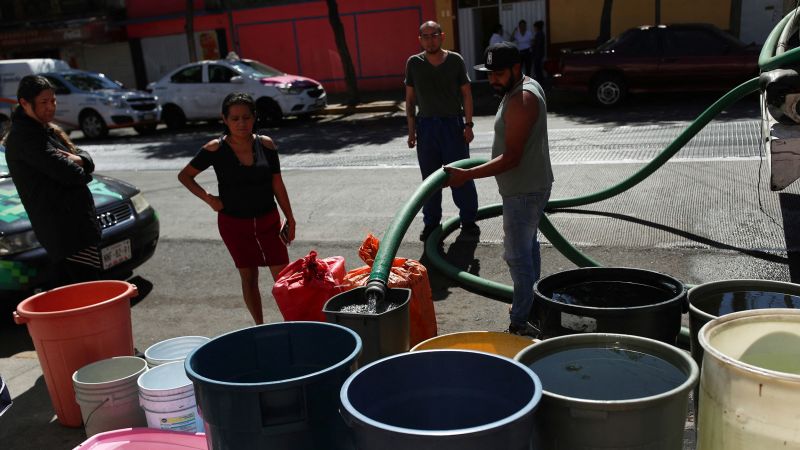Around 60% of Mexico City’s water comes from its underground aquifer, but this has been so over-extracted that the city is sinking at a frightening rate — around 20 inches a year, according to recent research.
holy crap
Holey crap
If true this is an unimaginable problem.
It’s going to become more and more common. We’ve altered the climate enough that weather patterns will change drastically, and we’ve been sucking aquifers dry as though they’re endless.
Keep your woke bullshit off my beautiful green lawn
Climate refugees are also going to be more of a thing, so that’ll be fun for conservatives.
No, I can imagine it pretty well.
What is now Mexico City used to be Tenochtitlan. An artist made a rendering of what Tenochtitlan might have looked like before the Spanish arrived. The entire place was a lake, and the city was built in the middle of the lake. It contained canals everywhere, and had causeways connecting the edges of the lake to the city.
I wonder if Mexico City has been effectively slowly “mining” that lake for centuries. I suppose the lake will be fed by precipitation, because the city is in a bowl so any rain that falls there will be collected, but does the amount of rain come anywhere close to matching what they’re using?
As an aside, to me it’s tragic that the main temple of the Aztecs was razed and a Catholic church was plopped down on top of it. Just as tragic is that the Spanish indoctrination process was so successful that only 0.3% of the country has a non-Christian religion. As a result, most Mexicans see the church the Spanish had built not as a grotesque symbol of the destruction of the original city, but as a good and holy place.
Spanish drained the lake in multiple steps to build the modern city. The water they are using is ground water, pumped in an aquifer. Mexico city has a network of canals to drain the storm water.
The other issue is the aquifer doesn’t recharge enough due to the urbanization and consumption. One solution is to use the rain water by cleaning it and storing.
They drained the lake, but if I understand how lakes work, the aquifer is connected to the lake bed. So, initially there was so much water in the aquifer that some of that water was above ground in the form of a lake.
One solution is to use the rain water by cleaning it and storing.
Are you saying that right now the rain water doesn’t reach the aquifer? Like, it’s drained outside the city? Or that instead of having it trickle down into the aquifer, they could collect it above ground and make it available more quickly by cleaning and storing it in man-made structures?
If it’s the second, it sounds like not allowing the rain water to reach the aquifer will mean that it drains more quickly.
You don’t have all the time an aquifer under a lake. You can find lake on impermeable soil, for example. If connected to an aquifer, you still have some sort of soil between the lake and the aquifer. They drained the water of the lake and the soil when solid at the air. This is why if the aquifer is too low, you have a risk of collapsing.
With urbanization, they build houses, buildings, later parking, paved streets, etc. Each of them is sealing the ground. The water flow in the storm water canals out of the city instead of going in the aquifer. You have a similar issue all over the world.
One project is to use the water in the storm water canals, treat this water and store it in multiple man-made structure like reservoir. We mostly all use man-made structure for water distribution in the developed world. The issue with putting the treated water in the aquifer is that if the treatment went wrong, it contaminates the entire aquifer. The entire aquifer would be unusable.
Here’s an oddity. The Spanish burned most of the Aztec and Mixtec (and Mayan) books, but an Aztec emperor did the exact same thing to Aztec books about a century earlier!
https://www.historyofinformation.com/detail.php?entryid=4395
And still today people are advocating burning books containing ideas they disagree with.
This is an incredible view into the past. I had no idea that tenoctitlan was so huge and organized. Thanks!
Yeah, such a shame we no longer harvest captives to take their hearts out :(
Yeah having little boys get raped by Christian pastors is definitely preferable.
Removed by mod
Wow that’s so different from the British pitting the Indians against one another. Or the Romans pitting German tribes against won another. Or the Chinese pitting the steppe nomads against one another. Or the Russians pitting the Americans against one another…
I’m afraid I never atested this rite you mention
Pretty silly when things are so black or white huh?
Your older relatives did so don’t worry
Oh fuck, I’m going there in April.
Fill your water bottle before you go!
Maybe 2 to be safe
2000 if you’re a capitalist.
Maybe bring a ladder to get down to the city
You’re not drinking the tap anyway. Supposedly even the ice in the drinks is from bottles. The locals drink bottled too. I’ve never gotten sick there. It’s an amazing cosmopolitan city. You’ll have a blast. The ruins are sick. The dispensaries have mushrooms if that’s your thing. Tons of seafood. It was a moral quandary for me but I indulged in octopus last visit and it’s out of this world in many restaurants. Incredible museums and art.
How does one of the biggest cities on Earth have such poor quality drinking water? I’m not a water purification technician but, shouldn’t they have reasonable means to implement water treatment?
Thanks for the advice, unfortunately I’m a vegetarian. I’m going for the ruins actually! I’m a giant Mesoamerican history dork, in fact I’m reading a book about deciphering Nahuatl hieroglyphs. I got my route planned out all ready for the Museo Nacional de Antropología and Teotihuacan. I know enough Spanish to hopefully keep me out of trouble.
Removed by mod
I was there about 6 months ago. Just plastic water bottles everywhere. You’ll be fine.
That’s sad, that can’t be good for the environment.
Assuming you’re American? One of the first times I deprogrammed myself from “we’re the uncivilized colonies” was seeing the amount of water bottles consumed across Europe. The US is blessed with the water we’ve had. It’s not the norm.
I was living in Cape Town when we were like 70 days from running out of water. It’s a very bleak prospect. I remember my one doctor saying that as soon as there was no water he was closing his practice and leaving. No water means people don’t wash their hands and illnesses start spread like wildfire.
We were lucky to get rain just before we ran out of water, but we also had a lot of conservation efforts.
But as you can imagine, the rich people didn’t give a fuck and would water their gardens in the middle of summer and just pay the fines…
Running of out water?








